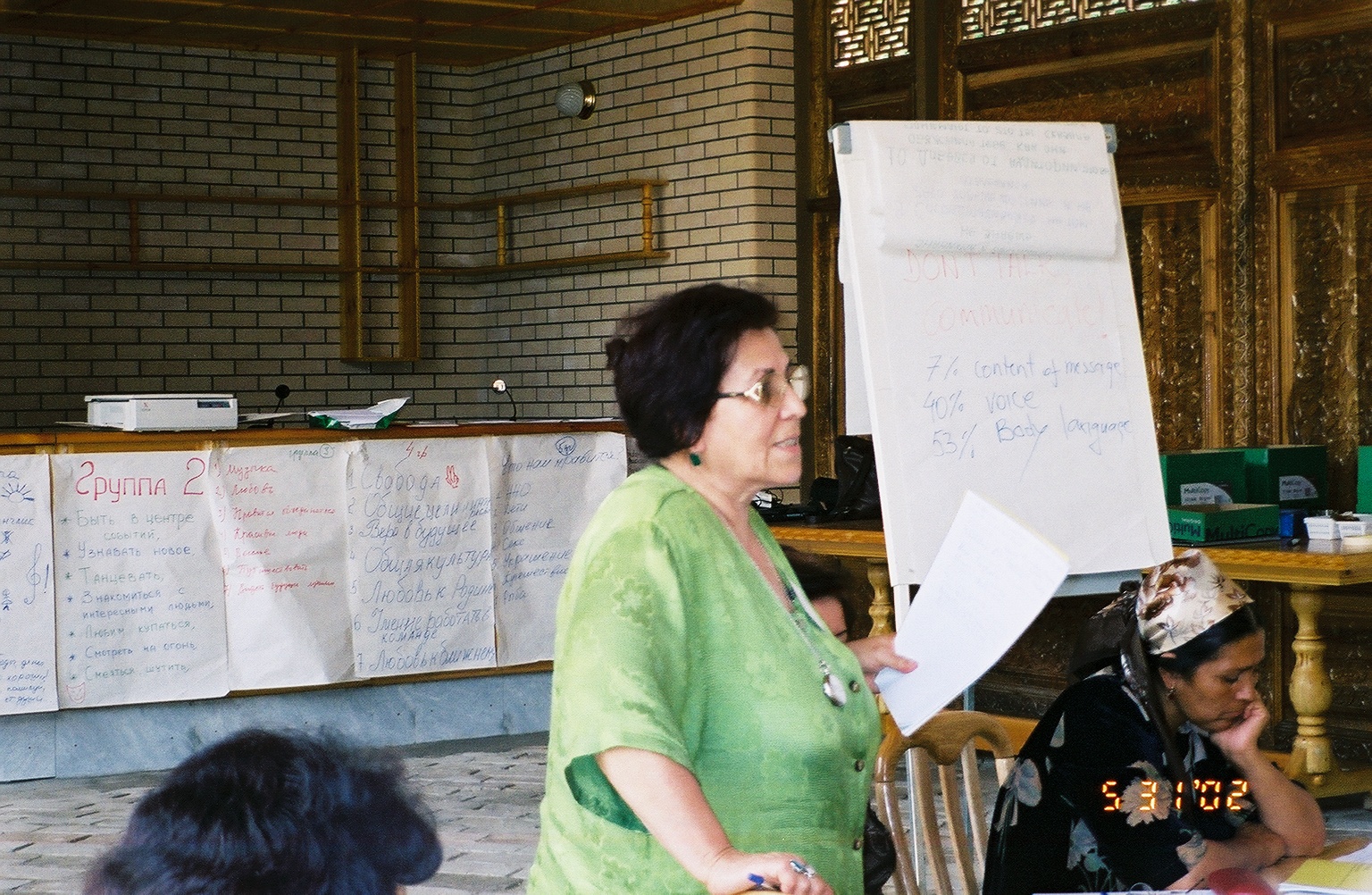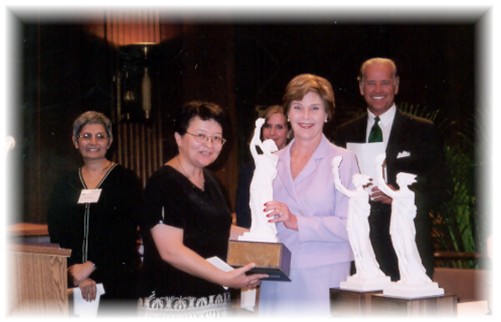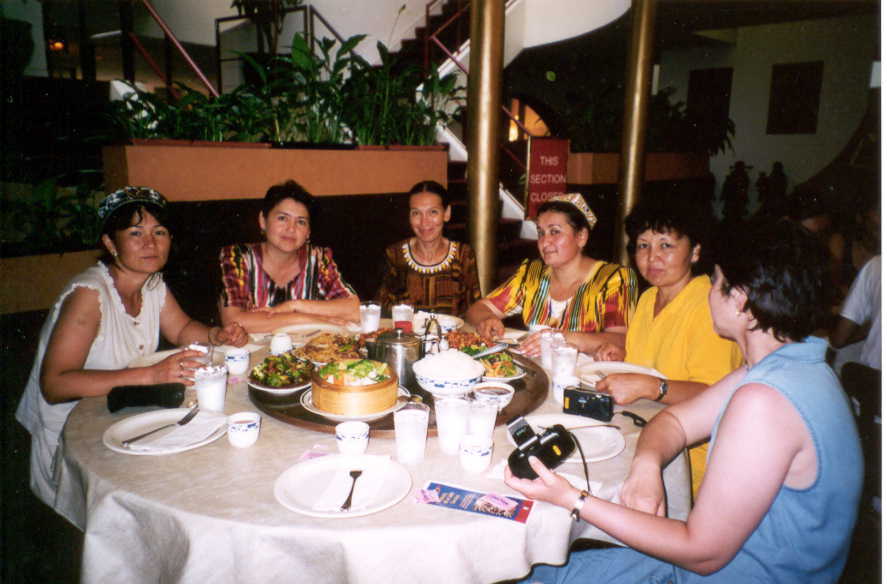|
What
is IDEE?
Programs
Publications
Links
Photogallery
Contact
Us
How
You Can Help

|
Civic
Partners—Networking Women in Central Asia
An IDEE
Program for Women Leaders from Tajikistan, Turkmenistan, and Uzbekistan
funded by the Bureau
of Educational and Cultural Affairs of the U.S. Department of State
Since 1999, the Institute for Democracy in Eastern Europe has
developed
Working Together:
Networking
Women in the Caucasus, an extremely successful program
in
the Caucasus that has promoted and sustained a cross-border network of
women NGO leaders from Armenia, Azerbaijan and Georgia. The program's
achievements
convinced IDEE of the need to implement a similar program in the
countries
of Central Asia, where civil society is steadily emerging, and where
possibilities
exist for positive dialogue, conflict prevention, and the formation of
a stable cross-border network.
Working with its partner in Uzbekistan, the Taskkent Public
Education
Center, directed by Muborak Tashpulatova, IDEE focused on enhancing the
leadership and networking capacities of women in non-capital areas in
Tajikistan,
Turkmenistan, and Uzbekistan, and facilitating a more open exchange of
ideas between geographically and ethnically separated communities.
Drawing
on additional resources from its Centers for Pluralism program, IDEE
and
TPEC also included women NGO leaders from Kyrgyzstan and Kazakhstan,
making
Civic Partners a fully region-wide program. In the 2001-2002 period,
the
program included the following:
1. Women's Leadership Training Program
IDEE organized a series of four intensive three-day training workshops
for thirty women over a five month period. A group of experienced
trainers
assembled from both the region and abroad led the workshops. The
workshops
focused on different themes, ranging from basic issues of NGO
organization,
management, and conflict resolution to the development of effective
leadership
skills, networking, marketing, and fundraising. The workshops also
placed
particular emphasis on intercultural cooperation and the transfer of
learned
skills to the participants' colleagues and other members of their
communities.
Upon completion of the workshops, the participants had reviewed
principles
of designing a project, drafting a proposal and a budget, and targeting
potential funders and partner organizations.
 |
 |
Networking Meetings: Participants at
the third
workshop of the Civic Partners program in Samarkand; at right, Novella
Jafarova Applebaum of the D. Aliyeva Association for the Defense of
Women's
Rights in Baku, Azerbaijan shares her experiences with her Central
Asian
colleagues in Tashkent.
2. U.S. Study Tour July 2-15, 2002
Following the in-country workshops, IDEE invited six women to
Washignton
DC for an intensive two-week study tour. The tour linked participants
with
their American counterparts and provided first-hand knowledge of how
the
NGO sector works in the U.S. The tour also included meetings with donor
organizations interested in supporting NGO work and women’s leadership
programs in Central Asia, such as the American Federation of Teachers,
the National Endowment for Democracy, the American Association of
University
Women, and Aid to Artisans. The participants were chosen because of
their
active status as NGO leaders who are dedicated to assisting NGO
development
and cross-border communication and expansion in their own countries.
 |
 |
| Muborak
Tashpulatova
receiving the NED's Democracy Award from First Lady Laura Bush during
the
U.S. Study Tour in July 2002 |
WICA U.S. Study Tour
participants in Washington,
DC |
3. Small Grants Program
The small grants competition from the previous two years of "Working
Together: Networking Women in the Caucasus" were highly successful in
promoting
NGO develoment, civic iniatives, and cross-border networking. IDEE
organized
a similar program for ten projects that promote cross-border or
cross-regional
cooperation in Central Asia. The grants, averaging $750 each, proved
once
again how much can be achieved through modest sums of money. Some
examples
of the grant recipient projects involving partners from two, and often
three countries, are:
-
A workshop for teachers from Turkmenistan focusing on interactive and
democratic
educational methods and an exchange for Turkmen women to make contacts
with NGO activists in Uzbekistan;
-
A forum in the Fergana Valley on conflict resolution and conflict
prevention
aimed at promoting cultural ties between communities in Uzbekistan,
Tajikistan
and Kyrgyzstan;
-
A series of seminars and roundtables focusing on overcoming women's
unemployment
and poverty in Tajik and Uzbek villages;
-
Four seminars covering issues of NGOs and society, the State and the
Constitution,
organizational management, teamwork, leadership and the basics of
entrepreneurship.
4. NGO Handbook
The Tashkent Public Education Center (TPEC) organized an editorial
team of NGO representatives who attended the workshops from Tajikistan,
Turkmenistan and Uzbekistan, which finalized and edited four
mini-handbooks
with information useful for NGOs and the informal civic community. 150
copies of the handbook were published in each of three languages of the
region - Russian, Tajik and Uzbek. The handbooks are entitled: "Citizens'
Forums as a Way of Problem Solving," "Writing a Grant Application,"
"Women's Share," which describes women's and gender issue clubs
in the region, and "Micro Crediting and NGOs." As of today, many
reprints were added and the "Citizens' Forums as a Way of Problem
Solving"
is functioning in the area as one of the manuals.
What
is Idee? | Programs
| Publications | Photogallery
| Useful Links | Contact
|

